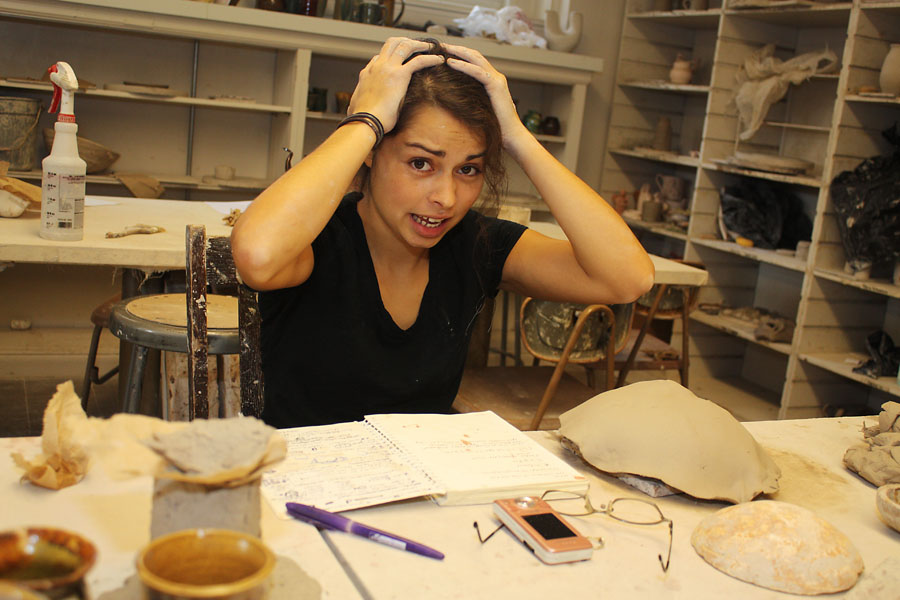Anna Pasquarello had hoped to go home for midterm break, relax and let her mind rest a little, but that’s not what happened.
Pasquarello spent her break on campus, trying to work at her on-campus job as much as possible to fix her car, finish up her book to be published by Pinchpenny Press and do all the other homework due after the three-day break.By the time classes were in session again, Pasquarello hadn’t been able to complete most of the items on her to-do list. It wasn’t that she hadn’t tried, but that stress had prevented her from focusing or finishing much at all to the point that she now says she’s not even sure what she did do over the break.
Pasquarello said that it seems like she’s most stressed this year, her senior year, than she has been in the past. She gets anxious about the future, whether it be next week or next year, and she said she really only wants to focus on things that relate to that more distant future and not the busyness of many of her classes.
“Is comparing the doctrine of affections and the Pythagorean philosophies really going to make me a better sound technician?” she asked.
Pasquarello is one of many students who spent a majority of their midterm break working on projects, papers and studying for tests, and who are still stressed after the five-day weekend.
Campus Counselor Char Hochstetler said that she has seen more students than usual dealing with stress this semester, but much of that might be because of such a large incoming class.
“The stress is very real,” she said. “This is a stressful environment.”
Hochstetler said that this does seem to be a more stressful time of life; even more stressful than post-graduation. Unlike many people who are able to go to work and then come home, leaving their work at the workplace, students often never know for sure if they have studied enough. Then, there are the stresses of a new environment for first-years at Goshen College; living in close quarters with others, and all of the internal growth and learning that comes with growing older.
“We always have to manage [stress],” she said, “but sometimes we have to manage more than other times.”
Like many other students, Pasquarello said she can tell she is dealing with an unhealthy amount of stress “when [she] can’t sleep at night and even Tylenol P.M. doesn’t knock [her] out.”
Hochstetler said that most people know what they need to do to be able to handle lots of stress, like get enough sleep.
“But it’s very hard to keep things in perspective,” she said, “and the mind just goes [wild],” which makes sleep, concentrating and working difficult.
Hochstetler also said doing something physical and active, like jogging, playing racquetball or another sport, is a great way to deal with stress. She suggests 30 minutes of physical activity three times a week. In general, Hochstetler said that students should try to do at least one thing per day that is a “want to,” and not a “have to”—something he/she wants to do that isn’t a requirement for a class or something else.
If a student doesn’t have the time for that, learning a focusing, centering breathing exercise can help. Try counting to five while breathing in, then again when breathing out. Or, take slow, full breaths in, but when breathing out, visualize your body loosening and relaxing. The counseling services on-campus also offers a booklet with more detailed breathing exercises and other internal practices to fend off unhealthy stress.
Hochstetler said trying to take one day at a time, so a person isn’t overwhelmed with the big picture, and talking through situations with other friends can help a person simplify his/her perspective.
Hochstetler is available to talk through stress and the resulting issues at the Health and Wellness Center. Schedule an appointment by contacting 535-7474.

